Wikipedia is one of the most (if not THE most) authoritative sources on the internet. With an average of 8 billion pageviews every single month and over 6 million articles posted only in the English version of the colossus, Wikipedia claims its well deserved spot as the 5th most visited website of the planet.
Yet, it does not serve any ads to its users. How is this possible? Every other site you visit on a daily basis probably runs ads to survive. How come the 5th most visited site in the world doesn’t? Can it survive solely on donations?
And… is there any way you can promote yourself on Wikipedia, even if it’s forbidden? Let’s find out.

- 5 Workarounds for Promoting Yourself on Wikipedia
- Why Doesn’t Wikipedia Serve Ads?
- How Does Wikipedia Survive?
- Donation Controversy
- Contributors Number Going Down
5 Workarounds for Promoting Yourself on Wikipedia
Even though there might be no way to directly advertise on Wikipedia, there are clearly ways you can get your brand or message on it. However, self promotion in a very… promotional manner is prohibited. For example, autobiography is not recommended as it cannot be truly objective. In fact, nobody close to you should actually write about you, your company or your products. You can still do it, though. But the risk of it being rejected is high.
But as long as you stick with the community’s standards, you’re definitely good to go. Before we get to the actual things you can do, I’ll share a couple of old stories with you regarding online advertising and Wikipedia.
1. Marketing Play
The famous tire manufacturer Pirelli used it to boast about its advertising prowess, some time ago. Their technique, according to the ad, was to “doctor” Wikipedia articles in a somewhat novel way: by replacing the pictures previously used to illustrate certain Pirelli and tire-related articles with higher-quality images but with a twist. In their own words, what was characteristic of the new images was that “the Pirelli brand appeared on every single image in a super contextual way, turning the image into a powerful ad placement.”



What Pirelli did was to “improve” Wikipedia articles about the brand with high-quality images from their own bank which had the brand name visible in subtle and not-so-subtle ways. While some images only had the brand name visible on tires (not very in-your-face), others were much more obvious, having Pirelli banners at the center and race cars barely in the background. The idea apparently came from advertising agency Havas Digital. Regardless where it came from, it caused quite a stir.
However, hold on your hats, ‘couse it was all fake!
Wikipedia’s reaction was swift and decided that it was all a fake. All changes are carefully and closely tracked by a fierce team of Wikipedia editors. If you’re a brand, that goes double for you. So what were the chances for Pirelli to deploy those changes long enough so that they’d get to capture them for the tire company’s ad? Planting images would ring as big an alarm bell as planting words or links. Administrators of the online crowdsourced encyclopedia were quick to set the record straight and emphasize that their photographs policies are very clear and favor Wikimedia Commons content over proprietary content, even when image quality might be higher for the latter.
There were even people who checked and confirmed at the time that no attempts had been made to change photos on the advertised articles . Perhaps somewhow ironically (depending on your definition of the word), Pirelli didn’t catch that boat even after the incident: there is no mention about this incident on the Wikipedia page for Pirelli, or anywhere else in the encyclopedia, for that matter. But despite that and the fact that Pirelli itself later admitted to it all being a fake and carried out as a guerilla marketing stunt, the idea of “cracking” Wikipedia was planted in the minds of marketers everywhere.
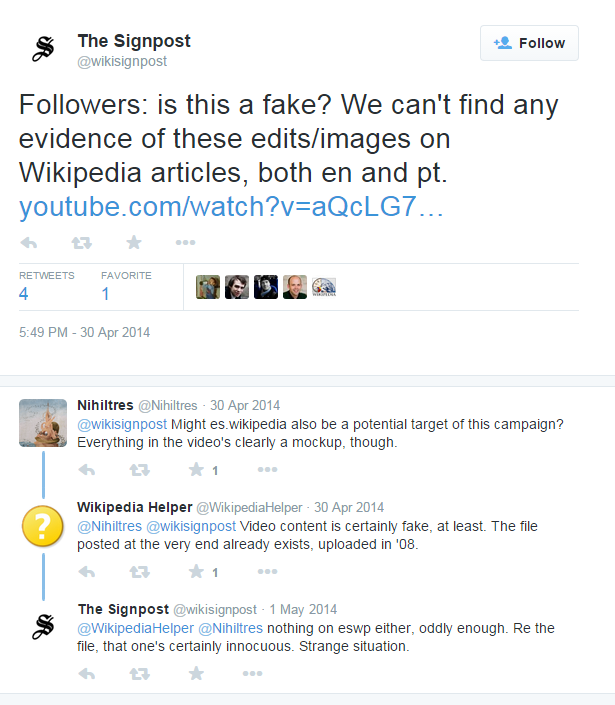
The video was removed from Pirelli Brazil’s Youtube channel , yet copies of the video continued to create uproar. Ralph Traviati, the company’s spoke person stated that the video produced by Harvas was only a demonstration of an initiative that was never implemented. Yet, knowing Wikipedia’s policy towards advertising, why would anyone try to have such an initiative? However, the PR did their part well and some reactions were spawned on Twitter as well, as you can see in the screenshot above.
If you care about your time, don’t waste it on trying to do anything like that. It will get flagged and removed quickly. There are over 100.000 active users and over 1000 admins ready to ban your account and IP. Pirelli was successful in this because it got some coverage in the media. Fake news isn’t very appreciated, however the marketing play above isn’t something people will necessarily dislike.
2. Conflict of Interests
A perhaps even bigger scandal developed in the fall of 2012 and involved accusations of product placement on Wikipedia. What happened was that the Did You Know (DYK) section on Wikipedia was seemingly assaulted by articles about Gibraltar. Sure, it’s an interesting territory, but to appear 17 times in the DYK section in a single month is a feat that borders the unbelievable. Mostly because it is hard to believe that it would pop up “randomly” so many times in a single month (all 17 times happened in August 2012).
So how did a territory of only 2.6 square miles make rounds on Wikipedia’s front page more times than any other subject (bar the Olympics)?
It turns out that these articles were all promoted by Wiki gatekeeper Roger Bamkin, who, incidentally, also happened to have a contract with the government of Gibraltar to publicize the territory on the online encyclopedia. Of course, most Wikipedia editors and board members have other daily jobs, but they’re not supposed to act on them while working for and on Wikipedia. But even though Bamkin’s actions were intuitively wrong, they were in a somewhat gray area: after all, he didn’t go and edit the articles in Gibraltar’s favor (a much more serious offense), he just gave them a gentle push to the front section.
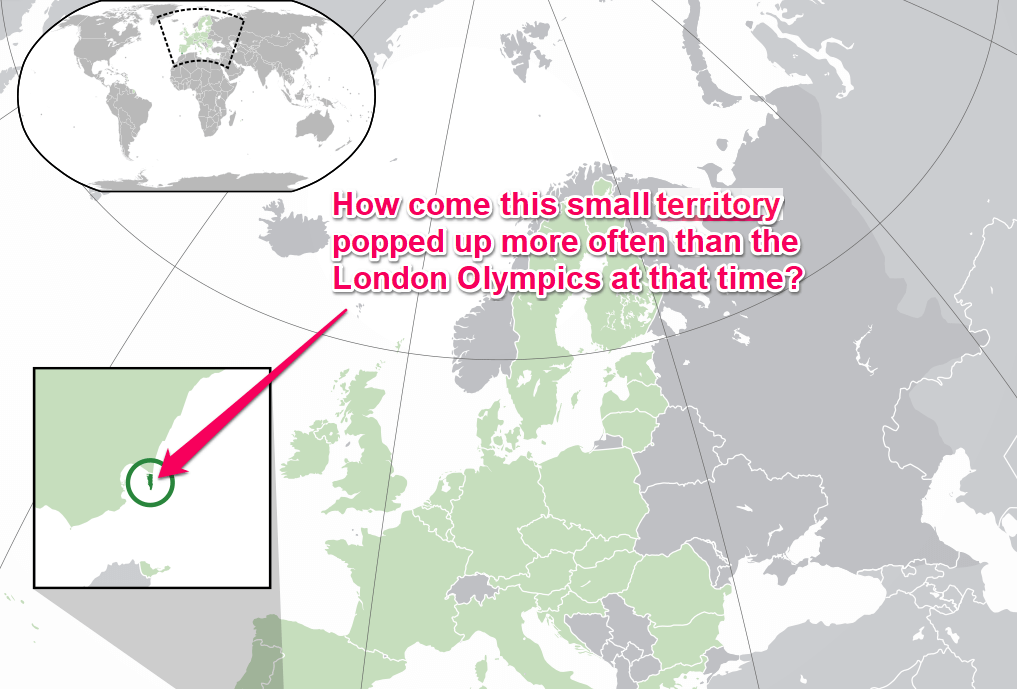
This gray area caused quite a stir among Wikipedia’s editors, with reactions ranging from disinterested to heated and everything in between. Some users even proposed the banning of the involved users. Wikipedia owner Jimmy Wales even came out and declared himself “disgusted” about the situation and requested a five-year ban on the perpetrators. Despite Wales’ attempts at dealing with the situation, things did not get better.
Just months after the original scandal, once the media agitation died out, Gibraltar came back strong in the DYK section.
So why nothing happened at the time? To put it simply, it’s because Jimmy Wales may be the owner, but he’s not the boss. In fact, there is no boss.
That is the beauty but also the problem with crowd-sourced initiatives: they work at a price. And the price is that sometimes there is no conclusion following a dispute.
To us, Jimmy Wales’ idea about the five-year ban might sound reasonable, but it doesn’t mean it’s going to sound the same to the people who are actually doing the work. The talks involving “Gibraltarpedia” on the Wiki talk pages seem never-ending, and opinions about the five-year ban range from “a bit excessive” to “a flat-out terrible idea”. And these are not users who are happy about the Gibraltar scandal (or at least they don’t seem to be), but rather users who seem to genuinely think about the impact of such a measure in the long run.
We invite you to take a look at the screenshot below and judge for yourself weather the Gibraltarpedia follows the rules imposed by Wikipedia itself. Not exactly, huh?

This trick can actually be used if you create a new page on Wikipedia. If you nominate your article it can appear on the HomePage of Wikipedia which could generate a significant amount of traffic. However, certain criteria must be met, like the article not being older than 5 days.
3. Getting Links from Wikipedia for SEO
SEO is also a form of marketing, so getting editors to link to you will help you, one way or another. The links might result in direct traffic or ranking boosts.
I’m sure you’re going to say something about all the links being nofollow, but I can counter that. Nofollow links can actually help you rank better. So if you can get relevant nofollow links, don’t hesitate to do it. Especially from such a highly authoritative source like Wikipedia.
However, creating an entire article requires a significant amount of knowledge. It’s not as easy as editing one. You also have to respect all Wikimedia’s fair use guidelines, otherwise you risk working hours for nothing.
You can start creating by using Wikipedia’s Article Wizard. It’s a good idea to first start with some edits, then work your way up to modifying sections or creating articles from scratch. Wikipedia likes interlinking between its own pages, so make sure you do some of those. Then, you can even start using your own articles/content as sources. A popular method is the broken link building method.
If you’re looking for topics to write about, you can check out the requested articles list. You can in fact list your own article there to request another editor to write it. However, it might take years if not forever for someone to pick it up, as the list is huge and, as I said, the number of contributors is dropping.
4. Paying Editors to Write or Edit
A quick hack into getting listed on Wikipedia or even getting a link might be paying a contributor to write your article or edit an existing one. However, this is easier said than done, as contributors that are paid must disclose this on their profile.
This is pretty much the same story as with SEO paid links. You must disclose the payment through the ‘nofollow’ tag.
You’ll probably find many ‘contributors’ there willing to do this for you. However, they’re basically doing what you would do. Create a fake account, post or modify something, write it poorly, not disclose it and then get banned.
Instead, stick to either the Reward Board, where you can ask existing editors to make some changes or work for you (considering it respects the guidelines, of course) in exchange for a financial reward.
Another way is to rely on professional teams from PR and advertising agencies like Ahn & Co. or EthicalWiki. They both provide guideline compliant Wikipedia writing services and even offer money-back guarantees against deletion. But one thing’s clear: they will be unbiased, so if you did something significantly wrong, it will probably be there. Even if they don’t add it, other editors will.
5. Google’s ‘Mentioned on Wikipedia’ Rich Snippets
One cool side effect of being listed on Wikipedia is the increased chance of being listed into Google’s Rich Results Snippets.
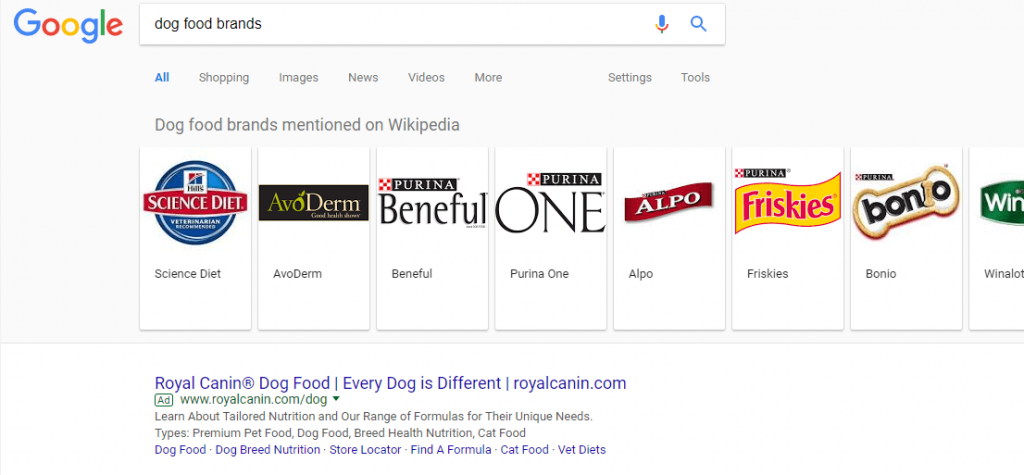
source: thesempost.com
Although suspected to be from WikiPedia, we wouldn’t truly know where the info was coming from unless Google revealed it after multiple complaints from users. The message “Mentioned on Wikipedia” solves the mystery. Thanks to Wikipedia’s well implemented structured data, Google is able to display the magic carousel.
But how can you get there? Well… the first step is to obviously get your brand listed. If it isn’t there, make sure you get there. You should also be listed in the appropriate category page. You can either do it yourself or hire someone to do it for you. Just be careful who you pick.
After that, there’s not much you can do to influence the order of these brands. I don’t know for sure, but it seems like the very popular ones are also the first to show. These snippets don’t even trigger everywhere. I couldn’t get a single one to trigger on my side, for example. Maybe Google’s just testing out.
One smart thing to do would be to follow the framework of a company that’s already listed. If they’ve done it, then it means that they’re doing something right. For example, the first brand from the example above has a very small and incomplete page. They even get some yellow flags, regarding promotional content, which Wikipedia clearly states:
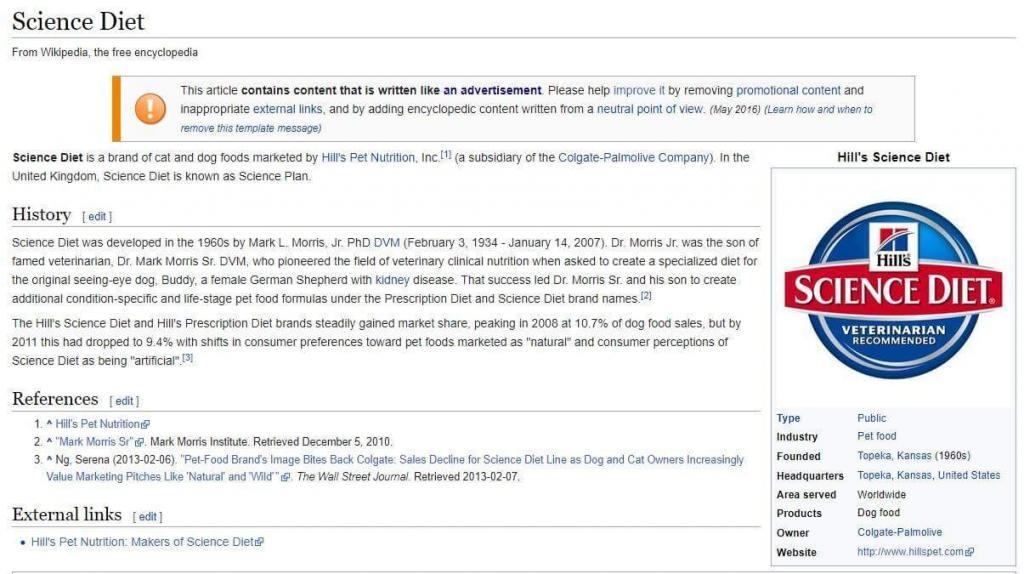
Purina’s page is definitely more detailed and lacking any warnings, but Google doesn’t really seem to care about that. As long as it’s listed in the appropriate category, it can get displayed first.
It seems like Google has a preference for snatching content off Wikipedia to display it in its snippets. If you can get it right and list your content in the right place, you might benefit from being listed number 0 on Google.
Why Doesn’t Wikipedia Serve Ads?
There are many reasons why Wikipedia does not serve ads to its users. All of them combined, make a pretty strong case. Wikipedia’s purpose is to be a source of education for everyone.
We all hate ads. As marketers, we accept them, but deep down inside our hearts, we don’t like them. Running ads on Wikipedia would affect user experience and, more importantly, would create conflicts of interest. Wikipedia is also open source. This means everyone can contribute. Contributors heavily oppose advertising, so running them might cause contributors to leave.
A full list of reasons against advertising on Wikipedia can be viewed here. You can, of course, find pro-advertising reasons as well. However, Wikipedia has been doing just fine without them, so far. We’ll talk about this in a bit.
If you do, however, see advertising on Wikipedia that references something else except Wikipedia itself, then you’re most probably infected with adware or malware.
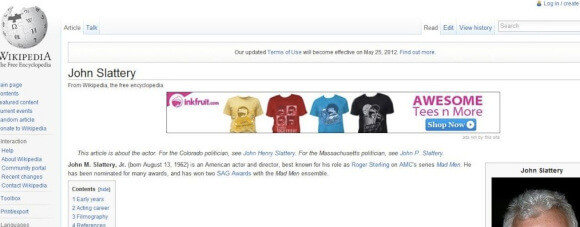
source: Wikimedia blog
In order to protect yourself, use an anti-virus or anti-malware software to clean your computer. Malwarebytes is a good option, both free and paid. You can also check your browser for unwanted extensions that might cause the issue.
If you see an ad on Wikipedia, it’s probably a virus.
A virus that only shows ads is called an adware. In general, it’s harmless and acts pretty much as an affiliate link, generating some revenue for someone. However, you should clean it as soon as possible, because it can also be a malware, sending you into a rabbit hole and infect your entire network.
All things considered…
Wikipedia doesn’t allow and probably never will allow advertising. In other words, a brand can’t advertise there in a traditional way.
How Does Wikipedia Survive?
Before we get to those workarounds, though, let’s see how Wikipedia has survived so far with no ads at all. Wikipedia survives on donations from its users. This is easier said than done, as donation-based foundations at this scale are very hard to run.
The key term here is value. Since Wikipedia offers a lot of value to all of its users, they’re eager to help. This trust has been built in years of hard work, as Wikipedia wasn’t always all this big and didn’t have such a high amount of readers or donors.
If you’re not familiar with it, Wikipedia periodically displays fundraising banners to ask readers for donations. They take different forms. Here’s just one example:
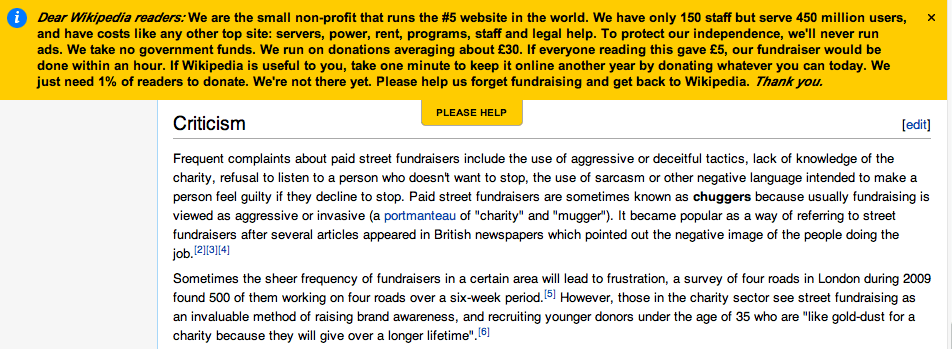
Even I donate to Wikipedia from time to time. At first, I didn’t like it. It looked just like a beggar asking me for money on the street. However, I gave it some second thoughts when I searched it for an answer on my smartphone, during an exam at school (don’t tell anyone).
Since Wikipedia has so many users, it only needs 1% of them to donate an average of $5 to achieve it’s goal of about $50 million. After all… it’s just the price of a cup of coffee.
https://www.youtube.com/watch?v=ydrpWcsaECg
Wikimedia’s fundraising campaigns results are made public and you can actually learn some things from them, because they’re very smart. For example, A/B testing and adding a few lines in the sales copy of the fundraising campaign added a gain of 29% to the number of donations in the U.S.
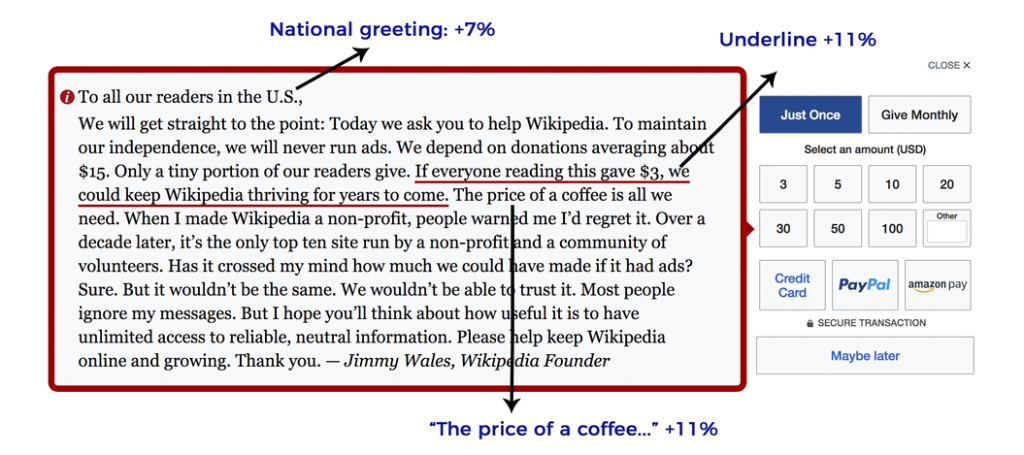
source: wikimediafoundation.org
But free stuff isn’t enough. Even with no ads, 99.9% of the time people are still unhappy, pointing the irony of Wikipedia’s fundraising banner by saying “”Wikipedia Runs Ads Highlighting Their No-Ad Policy”.
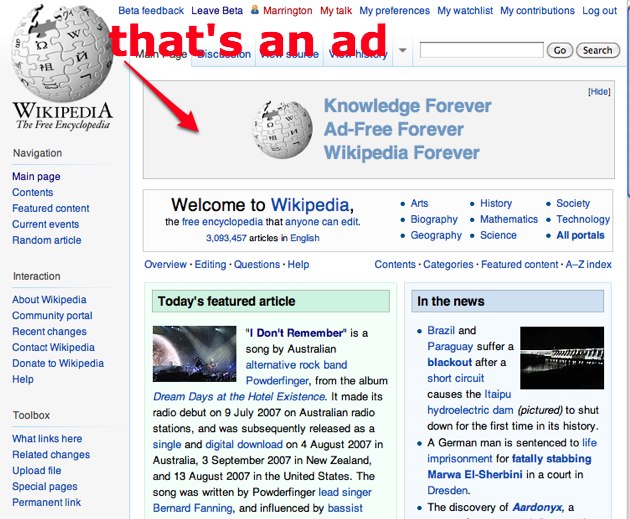
Source: techcrunch.com
However, that’s Wikipedia’s least problem, as media can get pretty harsh when it comes to money coming from donations.
Donation Controversy
In the past few years, Wikipedia has expanded dramatically in terms of servers, staff and fundraising efforts. So much so that in the last couple of years they have well exceeded the needed amount to sustain the website for the year to come.
People have been asking where all this money goes and it’s a fair question. But Wikipedia has been attacked by numerous sources, claiming that they don’t actually need that much money and that they’ve been still asking for more. People have complained about staff travelling to pop concerts to take photos and for allocating $80,000 for a study on editing.
The truth is that The Wikimedia Foundation, responsible for Wikipedia and many other websites actually does a great job at handling the money, with a very high score from Charity Navigator. While the expenses are lower than the donations, it’s not uncommon for non-profit organizations to keep up money in a reserve, for unpleasant situations.
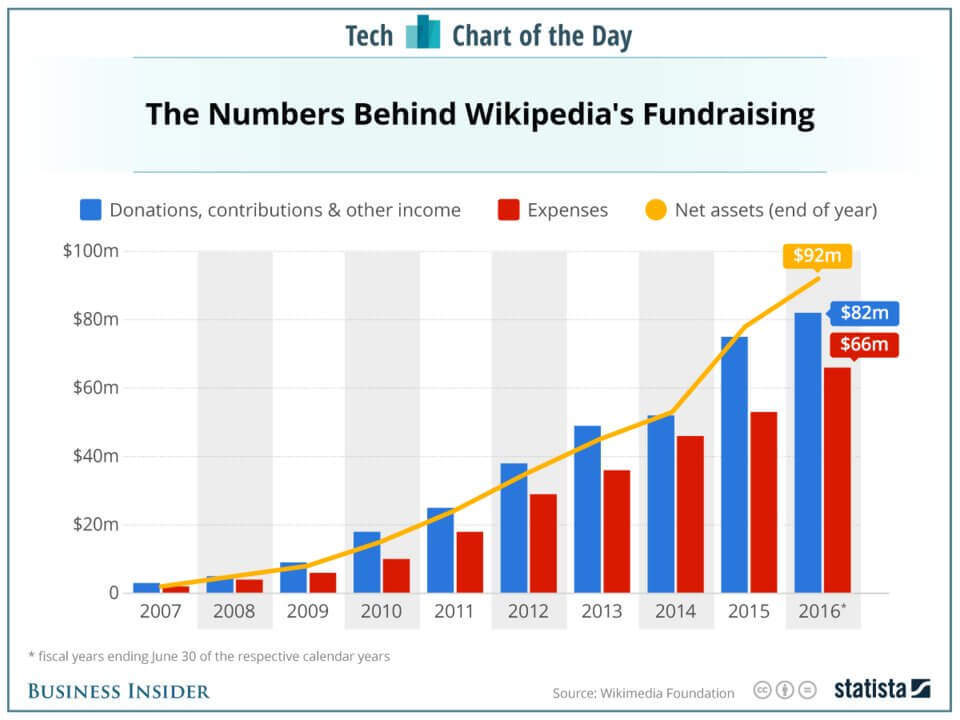
source: businessinsider.com
Now… if you’re so bothered that some employees will go to a couple of concerts off your $5 so you can happily cheat on your exams, then don’t donate. But, in my opinion, a donation based, non-profit organization doesn’t mean that the work there shouldn’t be fun. Do you expect anyone to sacrifice his days so you can know when XYZ was born?
And to question the necessity of an editing study really proves people have no idea what’s going on…
Contributors Number Going Down
Wikipedia is on a shortage of editors. It’s not easy to find volunteers to do this work. However, it has been working fine like this for a long time. People are still helping.
However, they’ve always been complaining about one thing. It’s confusing to edit. Editing can be complicated for newbies. Most readers don’t even have an idea that they can edit. So how can you make it easier for users to edit? How do you know what they like and what they don’t? What’s confusing and what’s not?
Well… you know, you might as well start off by conducting a study… Funded by donations… for a good reason.
Another thing people suggest is that Wikipedia makes a lot of money, while the hard working editors don’t. However, paying editors directly would mean that the project isn’t open source anymore. How would you differentiate between them? Which ones would have more power? Would they write objectively anymore? The only true way of Wikipedia working right is if it uses volunteer editors.
https://www.youtube.com/watch?v=-Ggk1BgdSd4
Paying contributors would result in conflicts of interest and would go against the foundation’s core values. Also, keep in mind that contributors are against running ads, which probably means they’re only doing this because they want to. The reasons why the number of contributors is going down are completely different and can go from difficult user interface to shortage of interesting topics or even conflicts with other contributors (such as deletionists).
Conclusion
Even though there isn’t a direct way to advertise on Wikipedia, there are other subtle ways you can get your name or brand out there. The best way to do it would be to actually contribute to Wikipedia. As long as your source is accurate, nobody will actually mind you placing a link. In fact, nobody will ever know it’s you. This, of course, unless you keep doing it a million times.
If you only edit one topic and always link to the same website it will be very obvious and someone will eventually put you down. Best thing to do is to actually stick to the rules. While it might not bring direct sales, having your name listed on Wikipedia is good for long term brand management.
What do you think of Wikipedia? Have you donated? Would you accept ads on it rather than donations? Have you ever built Wikipedia links to your website? How did that go? Let us know in the comments section, we’re very curious!

 Site Explorer
Site Explorer Keyword tool
Keyword tool Google Algorithm Changes
Google Algorithm Changes

Thanks for sharing with us, keep posting.
Google’s algorithm analyses links from trusted websites to gauge the relevance of other sites and Wikipedia is a trusted and relevant source. Building a page on Wikipedia can surely help a website in building a good backlink profile.
But, Wikipedia has implemented rel=”no follow” on all outbound links, which means links from Wikipedia do not pass PageRank or anchor textor create any juice.